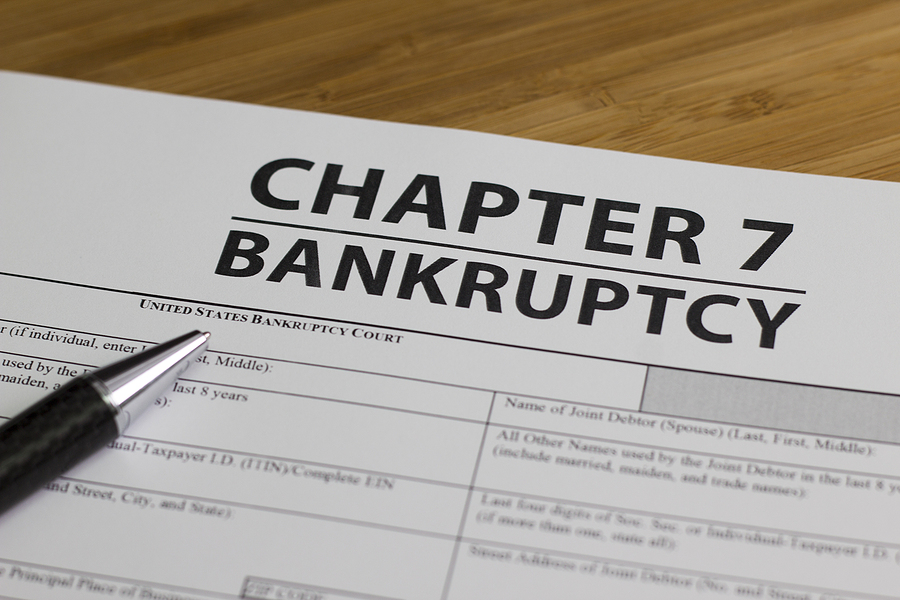If you feel overwhelmed by financial trouble, Chapter 7 bankruptcy can offer you a fresh start.
Of the 507,000 consumer bankruptcy petitions filed in 2020, 70% were filed under Chapter 7.
Chapter 7 bankruptcy requires that you liquidate your non-exempt assets to receive a discharge of your outstanding debts.
When you are ready to take control of your debt, a Chapter 7 lawyer in Hawaii can help.
The compassionate and knowledgeable bankruptcy attorneys at our Honolulu Bankruptcy Law Firm, can help you examine your debts and decide if bankruptcy is right for you.
To get started, contact us today.
Table of Contents
ToggleHow Does Chapter 7 Bankruptcy Work?

When you file for Chapter 7 (also known as “straight” bankruptcy), you are requesting that the court settle your debts by liquidating assets to repay the debt while also discharging a large portion of it.
When you file for bankruptcy, your Hawaii Chapter 7 bankruptcy lawyer will explain each step of the process.
Here is how Chapter 7 bankruptcy works:
- Eligibility: Not everyone will qualify for Chapter 7. You will need to pass the Means Test, which shows whether your income is lower than the state’s median for your household.
- Trustee: A bankruptcy trustee will be appointed. The trustee collects all non-exempt assets of the debtor, sells those assets, and distributes the proceeds to creditors.
- Minimum debt: There is no minimum or maximum debt limitation for Chapter 7 and the debtor doesn’t have to be insolvent.
- Discharge: The goal of an individual debtor in a Chapter 7 case is to get a “discharge” of their debts. In other words, bankruptcy is a tool that can help you get your life back from creditors.
What you don’t want to do is spend too much time waiting to actually apply for bankruptcy. The longer you wait, the deeper your debts will grow.
If you are on the verge of losing absolutely everything to your debt, then you should consider seeking out guidance from a seasoned bankruptcy lawyer at our Honolulu debt relief firm to help you through it.
Overwhelmed ByFinancial Troubles?
Facing overwhelming financial troubles? Discover a fresh start with Chapter 7 bankruptcy. Our Hawaii Chapter 7 lawyers can help you navigate the process. Chapter 7 involves liquidating non-exempt assets to discharge a significant portion of your debts. Whether you’re eligible, what assets you can protect, and how this process works, are crucial questions. Our experienced bankruptcy attorneys at Blake Goodman, PC, Attorney are here to provide answers and guide you toward financial relief. Don’t let financial troubles control your life; take action today.
What Is “Automatic Stay”?
The automatic stay is a feature of bankruptcy law that goes into effect immediately upon filing a petition.
This forces creditors to stop all collection actions against the debtor, including:
- Foreclosures,
- Repossessions,
- Garnishments,
- Evictions.
During this process, the collection and distribution of assets can occur according to a fair and orderly method as specified in the Bankruptcy Code. Above all, filing Chapter 7 will give you the time to review your best options with a qualified bankruptcy attorney.
What Should I Expect from a Chapter 7 Lawyer?

Bankruptcy law is complicated. Our Chapter 7 lawyers in Hawaii understand the nuances of the United States Bankruptcy Code, the Federal Rules of Bankruptcy Procedure, and the local rules of the District of Hawaii.
We have made it our mission to protect your assets from debt collectors and to find a way to relieve you of financial pressure.
Your bankruptcy attorney will have all the answers you need to complete the process, including:
- Whether you should file for bankruptcy;
- Which chapter you should file under;
- Whether your debts are dischargeable;
- Whether you will be able to keep your home, car, or other property after you file for bankruptcy;
- The tax implications of filing;
- Whether you should continue to pay your creditors;
- What you need to do to comply with bankruptcy law and procedures; and
- How to complete and file the necessary forms.
An experienced debt relief attorney knows which forms to file, and can help you with the debt settlement process, including filing deadlines, and the details you must disclose.
Your bankruptcy attorney will guide you through the process to avoid legal misunderstandings or procedural errors that could jeopardize your rights. They will explain each step’s consequences so there are no surprises along the way.
Which Assets Can I Keep in Chapter 7 Bankruptcy?

Under federal or state exemption laws, individual debtors are entitled to keep certain assets free from the claims of creditors.
Typical exemptions are the homestead exemption, cash value of insurance policies, household furnishings, clothing, and wages. Tools used in the debtor’s job are also protected.
The amount of the exemption depends on whether federal or state exemptions are available and or used.
Exempt property can include:
- The equity in your home up to about $25,150 per person filing
- Motor vehicles, up to a certain value
- Reasonably necessary clothing
- Necessary household goods and furnishings
- Household appliances
- Jewelry, up to a certain value
- Pensions
- A portion of unpaid but earned wages
- Public benefits, including public assistance (welfare) and Social Security
Generally, a discharge means that a debtor’s obligations are erased or wiped out. When a discharge is granted, it protects the debtor from personal liability on the discharged debt.
A discharge is only available to certain debtors and for certain debts. For example, debtors that are not individuals cannot receive a discharge in a Chapter 7 bankruptcy.
What Is a Secured Debt?
A secured debt is one where your creditor has a lien or security interest in something you own. For instance, if you’re paying off your car or house, these creditors have a security interest in the house or car.
In most cases, you will be able to continue paying on the secured debts without losing them.
You will also be given the opportunity to return these assets back to the creditor and erase all responsibilities for continuing to pay these debts.
A recent study shows individual debt has shifted from equity-backed mortgages to student loans and consumer credit, particularly auto loans. Some of these debts are “secured,” and others are “unsecured.”
A secured debt is one where your creditor has a lien or security interest in something you own. For instance, if you’re paying off your car or house, these creditors have a security interest in the house or car.
In most cases, you will be able to continue paying on the secured debts without losing them.
You will also be given the opportunity to return these assets back to the creditor and erase all responsibilities for continuing to pay these debts.
If the amount of the secured creditor’s claim exceeds the value of the collateral, the excess becomes an unsecured claim.
Unsecured debts are those for which the creditor extended credit solely based on the debtor’s ability to pay.
When it comes time to distribute the value of the non-exempt assets, secured creditors have priority over unsecured creditors, meaning they get paid first.
Will I Be Able to Keep My Home in Chapter 7?
Whether or not you can keep your home and car will depend on several factors.
Can You Keep Up with Payments?
You may be able to keep your home during a Chapter 7 plan if you are able to exempt the equity you have and if you can continue to pay the mortgage after bankruptcy.
An exemption effectively means your equity is protected from being sold by the bankruptcy trustee to pay your creditors.
Are You Covered by Exemptions?
The bankruptcy code allows for debtors to utilize bankruptcy exemptions to the fullest extent. The federal bankruptcy rules allow for a home equity exemption of $25,150; which is double for married couples filing jointly.
If these amounts are equal to or greater than the amount of equity you have in your home, then the trustee will not be able to sell your home.
Even if your mortgage exceeds the full value of your home and you have no equity, Chapter 7 can still be very beneficial.
Without filing for bankruptcy, the lender would be able to foreclose on the home, and then sue you personally for the remainder of the debt.
However, if you cannot afford to keep your home, you can surrender the property and the remaining amount owed will be completely wiped out in Chapter 7.
Can I Keep My Vehicle in Chapter 7?
If you own your car when you file Chapter 7 bankruptcy, it will be protected from being sold if its value is less than or equal to the allowed exempt amount. Similar to a home, you can use the exemptions to maximize the property you can keep.
If you are being threatened with repossession of your vehicle, a Chapter 7 bankruptcy will stop repossession attempts immediately.
If your car was recently repossessed, you may even be able to get it back if you act at once. Contact our Hawaii bankruptcy attorney immediately for more information if your car was repossessed.
There are several options available to help you keep your vehicle if you can afford it. Some lenders will allow you to keep your car and will release you from the loan in exchange for purchasing the car at its current value (called a redemption).
Others will let you sign a new contract (called a reaffirmation) which may let you keep making the same payments you had before filing bankruptcy.
These options have important consequences, so it is best that you first consult with a qualified bankruptcy attorney before entering into a redemption or reaffirmation agreement with a lender.
What Happens After Filing a Chapter 7 Petition?
Once you file the bankruptcy petition, the next step is to attend the meeting of creditors. The trustee assigned to your case schedules the meeting, usually 21 to 40 days after filing.
During the meeting, your creditors can ask questions about your finances and property while you are under oath. The trustee will also ask questions about your understanding of the consequences and benefits of bankruptcy to check for abuse.
Most Chapter 7 debtors receive a discharge between 60 to 90 days after the date first set for the meeting of creditors unless a creditor objects to a discharge.
Do I Need Credit Counseling?
All individuals have 180 days before filing for bankruptcy to complete credit counseling. Credit counseling aims to help you explore alternatives and develop a budget for future repayment of debt.
Credit counseling usually involves an hour of online instruction and a phone call to discuss your financial goals. The fee is typically $50, but you can request that it be waived or paid in installments if you can’t afford it.
Only companies approved by the U.S. Trustee Program may provide credit counseling for bankruptcy.
Additionally, you must complete a debtor education course with an approved provider before receiving a discharge. You have 45 days after the creditors’ meeting to attend the course and submit your course completion to the court.
The classes can be taken in person, over the phone, or online, and they range in price from $50 to $100.
While counseling and education are additional work before you can receive a discharge, they can provide the skills you need to achieve your financial goals and avoid future bankruptcy.
What Are Alternatives to Chapter 7 Bankruptcy?
While you typically must relinquish your assets in Chapter 7 bankruptcy, other options exist. One benefit of having a Chapter 7 attorney is that they can negotiate with creditors on your behalf.
Although you can call creditors like credit card companies yourself, being contacted by an attorney usually has a greater impact. Your bankruptcy attorney can work with your creditors to devise an out-of-court repayment agreement that works for you.
Some examples of alternatives to Chapter 7 bankruptcy are:
- A debt management plan: This is where you make payment to a credit counseling agency that distributes it among your creditors, usually with a lower interest rate or waived fees;
- Debt consolidation: This is where you combine multiple debts into a single, new account that usually has a lower interest rate; and
- Debt settlement: This is where you stop making debt payments and instead put the money into an account dedicated to paying off settlements. While we usually don’t recommend this option for most debtors, it is a viable option for some.
Working with debt settlement companies can be costly. When you contact a bankruptcy attorney, they will listen to your situation and help you understand your options. They can help you begin to regain control of your finances right away.
Complete Financial Rehabilitation for Clients in Hawaii
Our Honolulu bankruptcy lawyers know that debt can be frightening. We also know that it can be difficult to know what effect your debt will have on your family’s future.
However, there’s no need to suffer the unknown. Having an experienced Hawaii bankruptcy lawyer can end the collection calls and put you on the path towards a new financial life.
We understand you have options when it comes to choosing a Hawaii chapter 7 lawyer. We want you to know that we care deeply about our clients.
When you contact us, we tend to view your situation as if we were standing in your shoes. Because of our firm size, we can provide more comprehensive, responsive, and attentive service than the competition.
We respond to clients until 9 PM during the week and 7 PM on weekends. We will guide you through the process of deciding to file for bankruptcy, filing the bankruptcy petition, and beyond.
Visit us at any of our convenient locations in Honolulu, Kaneohe, Aiea, and Maui.
Bankruptcy is never an easy choice. You can lose precious assets, and the bankruptcy can stay on your credit report for up to 10 years.
When you choose our firm as your bankruptcy attorney, we will support you even after your discharge. With our 720 Credit Rebuild Program, we’ll help you boost your credit score and take on sustainable, reasonable debt.
Locate Us
Our Locations
Enter your ZIP code to see which location is closer to you
